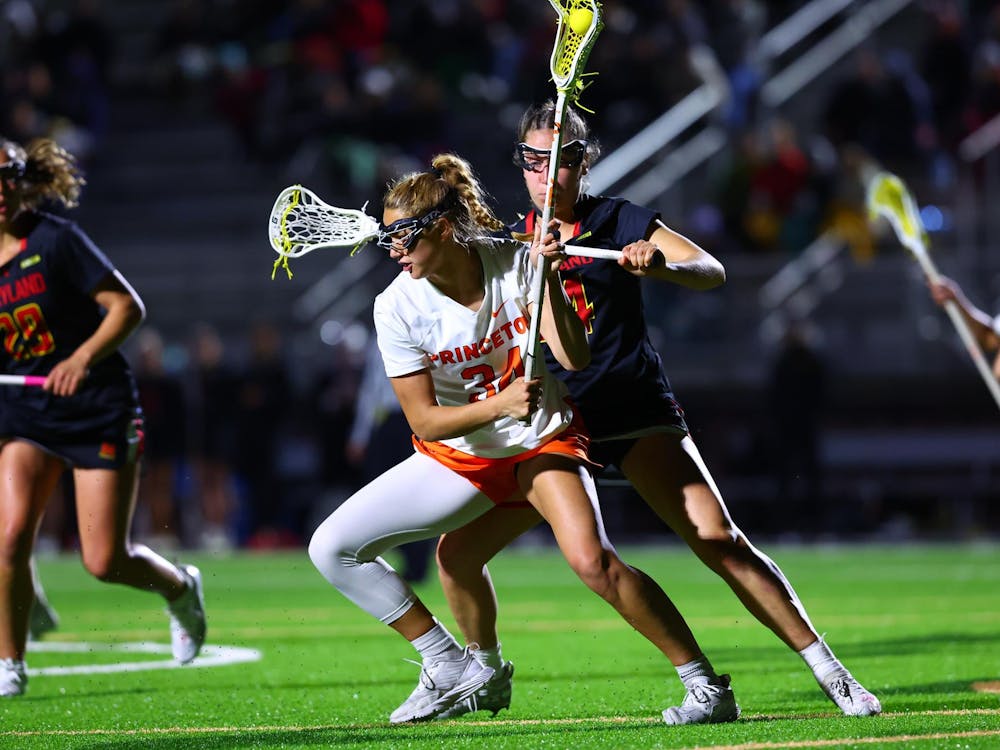A month after the University Board of Trustees voted to dismiss classics professor Joshua Katz following an internal report finding he violated University policies, questions around his dismissal still animate discourse both on campus and beyond as alumni, professors, and students in his field react to the controversial decision.
While multiple students and alumni who spoke to The Daily Princetonian expressed relief that a professor who had engaged in a relationship with an undergraduate would no longer be part of the faculty, other University community members have written publicly in disagreement with the University’s decision and in defense of Katz.
“I feel much safer and more comfortable within the department,” Cathleen Weng ’24, one current classics concentrator, wrote to the ‘Prince.’
News of the dismissal came on May 23, two weeks after President Christopher Eisgruber ’83 recommended Katz’s dismissal in a letter to the Board on May 10. The recommendation followed a 2021 University investigation into Katz’s conduct during a previous disciplinary proceeding in 2018 relating to his relationship with an undergraduate student in the mid-2000s. According to a University statement, the 2021 investigation by the dean of the faculty found “egregious violations of University policy” — namely, that Katz “misrepresented facts” during the previous proceeding, pressured the former student not to participate in the investigation after she expressed an intent to do so, and discouraged her from seeking mental health while she was an undergraduate in an effort to conceal the prohibited relationship.
Katz, who first joined the Princeton faculty in 1998, has denied these claims, writing in the Wall Street Journal that the student, who had graduated at the time of the first investigation, had “resolutely refused—of her own volition, I stress” to participate in the 2018 investigation and that he “provided the context, in full detail” at the time. He also called the process as a whole a “‘cultural double jeopardy,’” arguing that the dismissal constitutes retaliation by administrators for his controversial op-ed in the summer of 2020. (He did not respond to requests for comment for this story.)
Some current classics concentrators who agreed to speak with the ‘Prince’ said the dismissal to them was a welcome signal that the University had prioritized the safety and well-being of its undergraduate students.
Weng told the ‘Prince’ she believes “the Classics department and Princeton University have set a precedent with his dismissal which I believe promotes the safety and comfort of their students.” (Weng is an Associate Prospect Editor for the ‘Prince.’)
The ‘Prince’ reached out to all current faculty members of the Classics department, all of whom declined or did not respond to a request for comment.
Classics concentrator Andrew White ’23 recalled his initial feelings when he read the February 2021 ‘Prince’ investigation, which included allegations of Katz’s history of inappropriate conduct with three female students, including the mid-2000s relationship with an undergraduate advisee.
“My first reaction was absolute disgust,” he wrote in an email to the ‘Prince.’ “Followed by concern for my female classmates and members of my department.”
John Freeman ’24, another student in the classics department, wrote in an email to the ‘Prince’ that he remembers “being stunned” by the information of Katz’s previous relationship with a student.
But the news “never affected my experience in the department,” he wrote. “It only made me sad that such a man could have come from such a wonderful department with such kind professors, who have done wonders to aid my academic growth here.”

White, however, said it did affect his personal experience at the University. Though Katz has not taught a class at the University since the spring of 2021, he continued to be listed as a faculty member and it remained unclear to students like White whether he would teach in the future.
“I had decided never to take a class with him for the rest of my time at Princeton in solidarity with multiple female peers who expressed discomfort with the thought of being taught by him,” White said. “And that then brought more worry. Would I be punished with the opportunity cost of crucial course choices, just because the University couldn’t hold him fully accountable?”
But for other University community members, Katz’s dismissal has become a flashpoint of disapproval with the University’s decision-making, as a handful of current or former professors have spoken out in defense of Katz. At least one alumnus called for boycotting alumni donations in response.
McCormick Professor of Jurisprudence Robert P. George, who served as Katz’s official advisor during the disciplinary proceedings, wrote in a column published June 10 that he objected to the 2021 investigation into Katz’s relationship with an undergraduate student “because it resembled what, in the criminal justice system, would be double jeopardy.”
Katz had been placed on a year-long suspension after the 2018 disciplinary proceeding that established his relationship with a student in the mid-2000s, as well as three years of probation. A second investigation in 2021 began after Jane (a pseudonym given to the alumna by the ‘Prince’ for privacy concerns), who had not participated in the 2018 proceeding, submitted a complaint providing new information.
According to a University report, the second investigation “did not revisit” policy violations Katz had been punished for in 2018, instead establishing new violations.
George disagreed with this characterization, writing in Quillette that it was “wrong to investigate and discipline Professor Katz a second time for allegations arising out of the nexus of facts that gave rise to the first investigation.” In George’s view, the alumna “had been given every opportunity, and had indeed been encouraged, to make allegations and provide evidence of wrongdoing in the first investigation.” (The University has asserted that Katz had successfully discouraged her.)
Some have argued that the University’s investigation into Katz’s conduct was retaliation for a controversial column he published in 2020 in the online magazine Quillette. In the column, Katz pushed back against a then-circulating faculty letter that had advocated for a series of racial equity reforms on campus. He also referred to a former Black student activism group as a “small local terrorist organization,” drawing backlash from students, faculty, and Eisgruber himself, who also affirmed at the time Katz’s right to say what he did.
His comments about the student activist group were included — together with some of their criticism — in the first-year orientation website To Be Known and Heard.
Among those who believe Katz was unfairly targeted by the University as a punishment for his speech, constituting a violation against principles of academic freedom, is Katz’s wife and former student, Solveig Gold ’17.
Gold, now a doctoral student in Classics at the University of Cambridge, wrote in a column for Bari Weiss’s substack outlet Common Sense that “there is the chilling message Princeton has sent to Joshua’s colleagues and to academics everywhere: step out of line politically, and we will find a way to bring you down.”
Yet others who have supported Katz took a different view.
George, who acted as Katz’s advisor during the disciplinary proceedings, wrote in his own comments: “My difference of opinion with top university officials does not concern free speech.” Rather, he wrote, “It concerns due process.”
In a tweet, George asserted that “the Joshua Katz case is actually two cases—not unrelated, but distinct.” While he argued that using Katz’s language in the first-year orientation website may negatively impact academic freedom, George wrote in his comment that President Eisgruber’s “decision regarding the second investigation of Professor Katz does not directly compromise free-speech principles.”
Still others have argued that the University’s investigation of Katz was an affront to both free speech and due process.
A professor of English and Southern Studies at the University of Mississippi, Adam Gussow ’79 GS ’00 claimed in a column on the Princetonians for Free Speech website that Katz’s dismissal stems not from new details regarding his relationship with the mid-2000s alumna, but instead the fact “that Eisgruber, Vice Provost for Institutional Equity and Diversity Michele Minter, Dean of the Faculty Gene Andrew Jarrett, and pretty much every other right-thinking administrator, faculty member, and campus activist had viewed Katz as an embarrassing gadfly if not an outright ideological enemy for the past two years.”
As a result, Gussow wrote, he will no longer donate to Princeton’s Annual Giving campaign.
In an email to the ‘Prince,’ he decried “the double jeopardy element of this case,” saying the entire situation has “left a very bad taste in the mouth.”
After Katz published an op-ed in The Wall Street Journal alleging that the University “fed [him] to the cancel culture mob,” former Princeton politics lecturer Matt Franck tweeted that “I’ve never been prouder than at this moment to call Joshua Katz my friend. Nor have I ever seen Princeton disgrace itself so badly.”
Others affiliated with the University think the disgrace lies elsewhere.
Nadya Williams, who earned her PhD in Classics and Program in the Ancient World from Princeton in 2008, wrote to the ‘Prince’ after news of Katz’s dismissal that “honestly, I was just upset that the department never did anything before.” Williams published an Inside Higher Ed op-ed on June 8, in which she wrote that all of her professors, at Princeton and other institutions, were “amazing (and highly ethical!) scholars and mentors. And yet, open secrets about the existence of abusers in the field have been bubbling under the surface now for years.”
Robert Sobak, who earned his Ph.D. in Classics and Ancient History at the University in 2009, wrote to the ‘Prince’ that Katz’s “dismissal is long-overdue, and is a positive development for both the Princeton Classics department, and the field as a whole.”
“This should serve as a clear signal that this type of behavior will no longer be tolerated by colleagues and administrators, and hopefully encourage students to come forward knowing they will be heard,” he wrote.
“I would like to see a clearer articulation of appropriate boundaries both at Princeton and in academia in general,” Williams wrote to the ‘Prince.’ “It is never okay for professors to ‘date’ students.”
Some have expressed worry that the dismissal of Katz will affect the quality of the Classics department.
Gold wrote in her article that the University “has eliminated its most legendary language instructor.” She noted that the classics department had recently gotten rid of its language requirement “to encourage students to take ancient languages other than Latin and Greek,” and that Katz was the “only member of his department qualified to teach multiple such languages: Egyptian, Sanskrit, Tocharian, Syriac, Akkadian, Old Norse, Old Irish, etc.”
Freeman, however, doesn’t think Katz’s dismissal will change much in his department. The department “has many highly intelligent professors that will continue to do good work in this field,” he wrote to the ‘Prince.’ “That won’t change. And neither will their commitment to teaching and to fostering the supportive environment that I have come to know and enjoy.”
White, a rising senior in the department, hopes the University will find a new professor with experience in classical linguistics, for which he wrote there’s been a “three year gap.”
“There are plenty of students at this school (self-proclaimed classicists or not) who would find these topics interesting, but have lost the chance to take fun courses due to this entire situation,” White wrote.
Despite these shortcomings in instruction, he thinks Katz’s dismissal signals a positive change for the department.
“I’m excited for the department to begin taking forward steps, personnel-wise but also in general as we learn from this saga and build a community that hopefully doesn’t ever allow something like this to happen again,” White said.
Katz served as a trustee at the ‘Prince’ from 2014 to early 2020, and before that, as a faculty columnist from 2006 to 2013.
Paige Cromley is a sophomore who writes for the News, Features, and Prospect sections of the ‘Prince.’ She can be reached at pcromley@princeton.edu.









